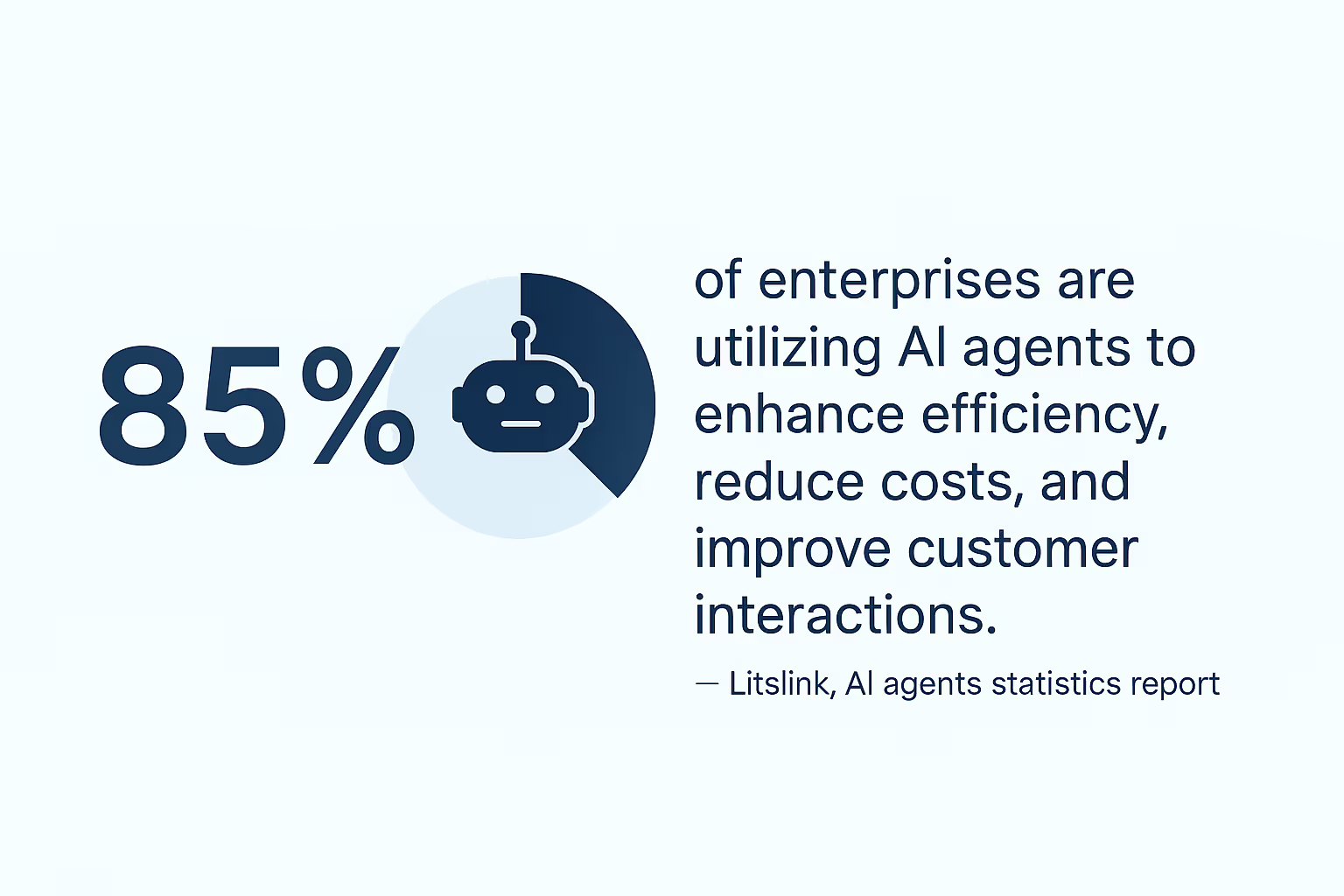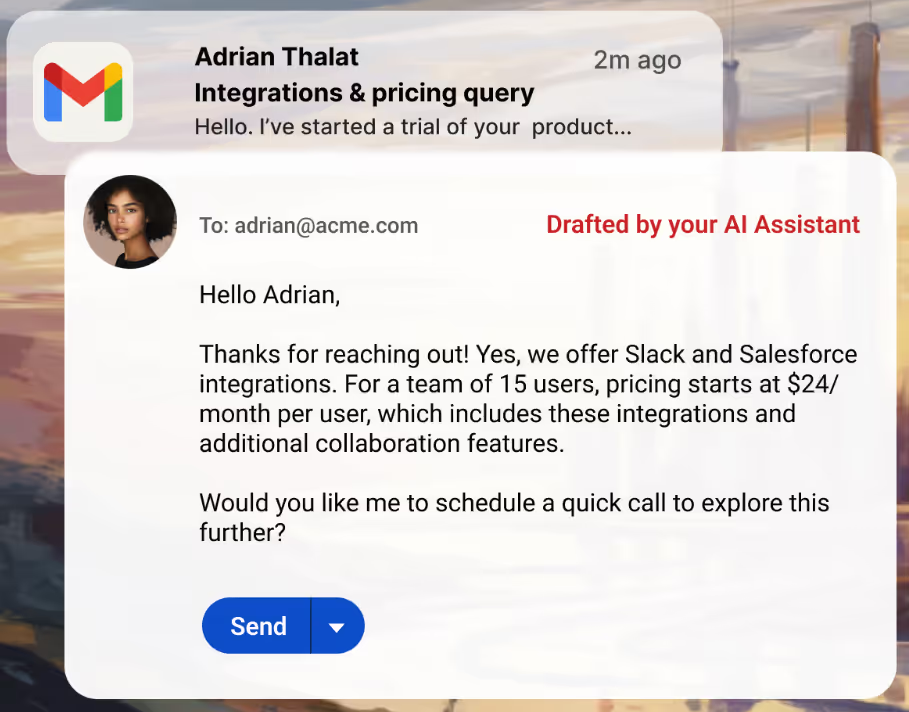For years, automation has been the buzzword in the business landscape, streamlining repetitive tasks. Now, the conversation has shifted. AI assistants are no longer a futuristic concept; they are a present-day reality, rapidly evolving from niche tools to indispensable partners across virtually every business function.
With the rise of virtual assistants, AI mail trends and intelligent collaboration tools, their ability to process vast amounts of data, learn from interactions, and execute complex tasks with remarkable speed is fundamentally reshaping how businesses operate.
In this article, we’ll delve into the different ways AI assistants are transforming business operations in 2025, from customer service and sales to HR, operations, and beyond.

The Emerging Role of AI in Business Operations
AI assistants represent a significant leap beyond traditional automation. While automation follows predefined rules, AI assistants can understand context, learn from experience, and even generate creative solutions. This cognitive leap allows them to tackle more complex, nuanced problems, moving businesses closer to true intelligent automation.
Consider the core 5 challenges businesses face today:
- Information overload: Drowning in data, insights are often missed.
- Customer expectations: Demands for instant, personalized service are higher than ever.
- Operational inefficiencies: Manual processes are slow, error-prone, and resource-intensive.
- Talent shortages: Finding and retaining skilled employees is a constant struggle.
- Innovation pressure: The need to continually evolve and offer new value to remain competitive.
AI assistants are emerging as powerful allies in addressing these very challenges, offering solutions that were once confined to the realm of science fiction.
AI assistants are transforming business in 2025 by handling complex tasks across customer service, sales, HR, and operations—cutting manual work, improving speed, and personalizing experiences. Their ability to learn, act autonomously, and integrate into daily workflows is making them essential to scaling intelligently.
How AI Assistants Are Transforming Business Functions
The impact of AI assistants spans the entire organizational spectrum, offering tangible benefits across various departments.
Customer service and support
This is perhaps the most visible and impactful area where AI assistants are making a difference. Beyond simple chatbots, today's AI assistants are intelligent conversational agents capable of handling a wide array of customer inquiries.
- 24/7 availability: AI chatbots and virtual assistants can provide instant support around the clock, improving response times and customer satisfaction, especially for global businesses.
- First-line support: They can answer frequently asked questions (FAQs), provide basic troubleshooting, and guide customers through common processes, freeing human agents for more complex issues.
- Smart triage and drafts: Tools like Gmelius automatically categorize and prioritize emails as they arrive, using AI tagging assistants and filters to make sure urgent requests are handled first. Also, emails are drafted without the need of a prompt, saving valuable time for the team.
- Personalized interactions: Leveraging customer data, AI can offer personalized recommendations, proactively address potential issues, and tailor communication to individual preferences
. - Multilingual support: AI can communicate in multiple languages, breaking down communication barriers and expanding a business's reach.
“85% of enterprises are utilizing AI agents to enhance efficiency, reduce costs, and improve customer interactions.”
— Litslink, AI agents statistics report
Sales and marketing
AI assistants are becoming invaluable tools for driving revenue and enhancing customer engagement in sales and marketing. Their ability to analyze data and automate personalized communication is a game-changer.
- Lead qualification and nurturing: AI can score leads based on their likelihood to convert, prioritize follow-ups, and automate personalized email sequences to nurture prospects through the sales funnel.
- Personalized marketing campaigns: AI analyzes customer behavior and preferences to deliver highly targeted advertisements and content, increasing engagement and conversion rates.
- Content generation: AI assistants can generate marketing copy, social media posts, and even basic articles, accelerating content creation and ensuring brand consistency.
- Meeting scheduling: AI can handle the back-and-forth of scheduling meetings with prospects, integrating with calendars and sending reminders.
Human resources (HR)
HR departments are embracing AI assistants to streamline administrative tasks, improve employee experience, and enhance talent management.
- Candidate sourcing and screening: AI can quickly scan resumes and LinkedIn profiles, identify suitable candidates based on job requirements, and even conduct initial screening interviews.
- Onboarding and offboarding: AI assistants can guide new hires through onboarding paperwork, provide access to resources, and manage offboarding logistics, ensuring a smooth transition.
- Employee support: Chatbots can answer common HR queries (e.g., benefits information, payroll questions, policy lookup), reducing the burden on HR staff.
- Performance management: AI can help analyze performance data, identify skill gaps, and suggest personalized training or development paths for employees.
- Internal communications: AI can help draft internal announcements, policy updates, and newsletters, ensuring timely and consistent communication across the organization. Gmelius goes a step further, with AI assistants that generate context-aware replies based on your internal knowledge base, no prompts required.
Operations and back-office functions
From finance to IT, AI inbox management is being transformed by AI assistants, bringing efficiency and accuracy to the essential but often manual back-office processes.
- Data entry automation: AI-powered tools can extract information from documents, invoices, and forms, automating data entry and significantly reducing manual errors.
- Invoice processing: AI can match invoices to purchase orders, identify discrepancies, and even automate payment approvals.
- Supply chain optimization: AI analyzes vast datasets on logistics, inventory, and demand to optimize supply chains, reduce costs, and improve delivery times.
- Fraud detection: AI algorithms can detect anomalies in financial transactions or user behavior, flagging potential fraudulent activities much faster than human review.
- IT support: AI chatbots can handle common IT queries, password resets, and basic troubleshooting, improving response times and freeing up IT staff.
- Compliance and risk management: AI can monitor regulatory changes, identify potential compliance risks, and ensure that business operations adhere to legal requirements.
Research and development (R&D) / Innovation
AI assistants are accelerating the pace of innovation by augmenting human research capabilities and providing powerful analytical tools.
- Data analysis: AI can rapidly process and analyze complex datasets from experiments, market research, and scientific literature, identifying patterns and insights that might be missed by humans.
- Hypothesis generation: AI can suggest new research avenues or generate hypotheses based on existing knowledge and data.
- Drug discovery: In pharmaceuticals, AI can screen millions of compounds to identify potential drug candidates, drastically shortening the discovery phase.
- Product design and simulation: AI can optimize product designs, simulate performance under various conditions, and even suggest new material combinations.
- Competitive intelligence: AI can monitor competitor activities, market trends, and patent filings, providing businesses with a crucial competitive edge.
Gmelius AI Assistants: Built for Real Workflows Inside Gmail
If your team operates in Gmail or Google Workspace, Gmelius offers one of the most fully integrated AI assistant systems available today—designed to support team collaboration, automate workflows, and eliminate inbox chaos.
Gmelius’ four AI assistants work in sync:
1. Reply assistant
Understands full thread context and your writing style to proactively draft smart responses—without prompting. It ensures tone and messaging consistency across your team.
2. Sorting assistant
Applies intelligent, auto-generated tags as messages arrive. Important threads float to the top. No more digging through clutter or missing urgent client emails.
3. Dispatching assistant
Assigns conversations to the right teammate based on criteria like workload, history with the contact, or role. It’s like an AI-powered traffic controller for your inbox.
4. Automation architect
This assistant observes workflows and suggests smart rules. For example:
- Auto-archive internal newsletters
- Auto-tag and assign client messages
- Auto-send reminders on unresolved support threads

Implementing AI Assistants: A Strategic Approach
Integrating AI assistants into business operations is not merely a technological upgrade; it requires a strategic approach and learning how to use AI in email correctly.
- Identify pain points: Begin by pinpointing specific areas where inefficiencies or customer dissatisfaction are prevalent.
- Start small, scale smart: Implement AI in pilot projects, measure their impact, and then gradually scale to other areas.
- Data is key: AI performance is heavily dependent on data quality. Invest in clean, relevant data to train your AI models effectively.
- Human-AI collaboration: Position AI assistants as augmenters, not replacements, for human employees. They handle the mundane, repetitive tasks, allowing humans to focus on higher-value, creative, and empathetic work.
- Continuous learning: AI models require ongoing training and refinement. Establish a feedback loop to continuously improve their performance.
- Ethical considerations: Address concerns around data privacy, algorithmic bias, and job displacement openly and transparently.
The adoption of AI assistants is no longer a question of "if," but "when" and "how effectively." From enhancing customer interactions and streamlining sales processes to empowering HR and optimizing back-office operations, AI is becoming the silent, tireless partner driving efficiency and innovation.
Businesses that embrace and strategically deploy these intelligent tools will not only survive but thrive in the increasingly complex and competitive landscape, freeing their human talent to focus on what they do best: innovate, strategize, and build meaningful relationships. The future of work is not just automated; it's intelligently assisted.
💡 Looking to bring intelligent automation into your inbox? Start your 7-day free trial and see how Gmelius can transform how your team collaborates and communicates.



![How to Use AI for Productivity [Infographic]](https://cdn.prod.website-files.com/6737568a4ac417efeb387e5a/69a5b7d84f5c5ab0c3f30f71_Teamwork%20Illustration.png)
.avif)
.avif)
.avif)
.avif)
.avif)